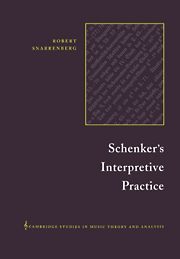
-
Select format
-
- Publisher:
- Cambridge University Press
- Publication date:
- 02 November 2009
- 28 May 1997
- ISBN:
- 9780511583056
- 9780521017435
- Dimensions:
- Weight & Pages:
- Dimensions:
- (247 x 174 mm)
- Weight & Pages:
- 0.325kg, 200 Pages
You may already have access via personal or institutional login- Series:
- Cambridge Studies in Music Theory and Analysis (11)
Book description
Schenker's Interpretive Practice is the first comprehensive study of this century's most influential music theorist, Heinrich Schenker. Since the 1960s, American theorists and musicologists have focused almost exclusively on analytical methods distilled from Schenker's writings. Breaking from that tradition, Robert Snarrenberg returns to Schenker's texts and to the humanist roots of his approach, situating Schenker's work in the broader context of his desire to portray the richness and particularity of musical experience. Snarrenberg concentrates on four aims that Schenker hoped to achieve: to present a theoretical account of musical effects encountered in European music of the eighteenth and nineteenth centuries, to represent the mindset shared among composers of that music, to convey the expressive interaction of musical effects in individual artwork, and to promote continued creative and re-creative participation in the musical tradition.Author recipient of the 1998 Young Scholar Award from the Society of Music Theory.
Awards
Author recipient of the 1998 Young Scholar Award from the Society of Music Theory.
Contents
Metrics
Altmetric attention score
Full text views
Full text views help Loading metrics...
Loading metrics...
* Views captured on Cambridge Core between #date#. This data will be updated every 24 hours.
Usage data cannot currently be displayed.
Accessibility standard: Unknown
Why this information is here
This section outlines the accessibility features of this content - including support for screen readers, full keyboard navigation and high-contrast display options. This may not be relevant for you.
Accessibility Information
Accessibility compliance for the PDF of this book is currently unknown and may be updated in the future.


